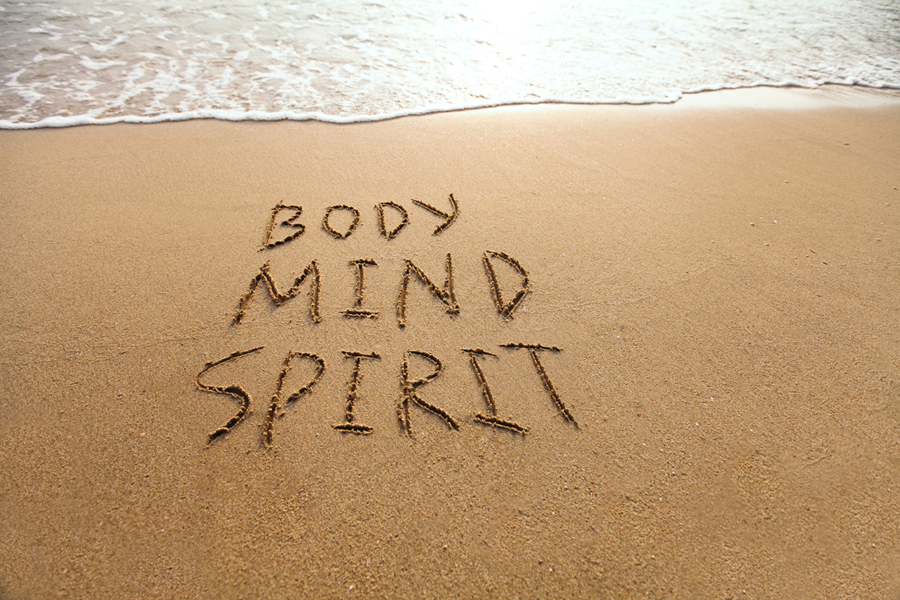
A resolution is an intentional form of change. We don’t arrive to a new year’s resolution, or any intentional change for that matter, by chance. Usually, there is a build towards this desire to change and a story behind it. It is important to acknowledge the deep importance of the resolution and accept that a significant shift is not typically easy.
To stick to your resolution, keep in mind that you need to be completely honest with yourself during the process. Set a realistic goal and ensure you have identified all the areas of support you will need to make the change happen. Rather than focusing only on what you need to eliminate and remove from your life, such as “no more coffee,” “no more sugar,” look for opportunities to add to your life. It is much easier to remove old habits when we replace them with new ones. One of the key aspects of maintaining new habits is incorporating ritual into your process. Ayurveda, or Traditional Indian Medicine, offers a wealth of inspiration for healthy rituals.
What is ritual, and why does it work?
Change is difficult because humans are creatures of habit. Consistency is comfortable and stable. While exciting and stimulating, change can also be unstable and stressful to the human system in many ways, so it is totally natural to struggle with adapting to a new pattern. Change can only happen when our consciousness shifts, and consciousness encapsulates all levels of the human system – mind, body and spirit. Ritual works because it incorporates all of these aspects for total integration.
Ayurveda is full of rituals for the physical, mental and spiritual aspects of our systems. What we do daily to stay balanced, such as our physical cleansing, exercise and meditation, is called Dinacharya. Our nightly and sleep routines are called Ratricharya. The routines we incorporate seasonally for optimal health, such as adjustments in our diet, exercise and preventive remedies are called Ritucharya. All of these routines are designed to help us ritualize our lives with Nature. Living Ayurvedically, we awaken with the sunrise, eat our largest meal with the midday sun and dream with the lunar cycle to maintain both internal and external harmony.
Living Ayurvedically also means living according to your personalized optimal health. You can customize your rituals and enhance them with a personal touch so they contain two essential ingredients for success: practicality and meaning. These essential ingredients of ritual make your rituals easier to remember, easier to do, and more powerful for enacting change.
To personalize your rituals, consider:
The story behind your change
By tying in elements of your personal story, you will feel more connected to the ritual and more easily embrace the change. For example, rather than a regular alarm, try waking to a song or mantra you find inspirational at this time in your life for starting the day.
Appease all the senses
The more sensory elements you incorporate, the stronger your ritual’s effect. Our olfactory sense can have an especially strong association with memory, which is how the therapeutic use of aromatherapy works. You can easily incorporate incense or essential oils in meditation, yoga and self massage, or try simply anointing yourself with an essential oil at key moments, such as before a healthy breakfast or heading out for a walk.
Tune in
Be fully present as much as possible during your new rituals. Taking mindful, deep breaths, closing your eyes and connecting with your heart center for just 15 or 30 seconds will do the trick quickly, and you just might find you want to stay in this state for a bit longer sometimes to deepen your self connection.

Remember the Three Pillars of Ayurveda
When designing your new health rituals, it can be helpful to consult the definition of health according to Ayurveda. Swastha is an Ayurvedic term for a “healthy person,” which means that a person is not just physically healthy, but also balanced in the mind, emotions and spirit. Swastha (health) is achieved through balance of the three pillars in life:
Āhara – Diet
Nidra – Sleep
Brahmacharya – Moderation & balance in the pleasure of senses
All of these three pillars contribute to the overall Swastha of individual. Brahmacharya may not appear as straight-forward as Ahara (diet) and Nidra (sleep). Brahman means “the divine” and charya means “the path.” So in essence, Brahmacharya is about being established in divine consciousness. To maintain our connection to our divine or higher self, not overindulging the physical senses is key. This doesn’t mean excessive self-restraint or control, but truly finding a balance between mind, body and spirit.
When adopting new lifestyle practices, it is important that none of these three pillars are neglected as a result. For example: exercise is important, but if you are cutting your sleep time short to exercise in the morning, you might need to go to bed earlier so you get the amount of rest you need.
Welcome whimsy by incorporating your new rituals into real life
Sometimes we have very rigid and formal concepts of what it means to live Ayurvedically – you know how this goes. You might feel pressured to check off every recommendation on your list, avoid all the foods which may cause imbalance, shut down any inclination of negative thinking. But this approach – constantly forcing and striving for perfection – is paradoxically more stressful, and leads to more dis-ease. Ayurveda translates to the “science of life” because it truly encapsulates real life, not an unrealistic ideal.
In Yoga asana, the final pose may not be available to you, depending on our mind-body’s current state. As Yogis living in the moment, we work with our bodies in the now, exploring today’s expression of a pose based with full dedication and acceptance. The pose is subtly different every time, and there is nothing wrong with that; in fact, exploring the shifts brings more clarity and awareness, reinforcing the mind-body connection.
You can take the same approach with all of your Ayurvedic guidelines and new year goals. You don’t have to sit for 30 minutes practicing Pranayama at your altar each morning if your morning schedule is too busy. Perhaps this practice is available to you twice a week, but for the other five days, don’t get stuck on not achieving the ideal. Instead, try five minutes while you are preparing your hot water, or some deep breathing while you are stuck in traffic or on the train. Tree pose can be practiced in line at the bank or grocery store (just put down the basket!). By being flexible and introducing an element of whimsy to your rituals, you’ll find them easier to adopt and more enjoyable.
You know rituals are working when you begin to look forward to them
Enjoyment, passion and commitment – this is the goal of any ritual design. If you are stuck and feeling more dread than joy surrounding a new habit, consider the methods above and redesign it. You may need to personalize the ritual more, expand it in creative ways, or tone it down and simplify it so it is more practical for your life. When truly stuck, it’s also ok to accept that a particular change is too difficult at a given time, and give yourself permission to change your timeline and intention.

Receive guidance from an Ayurvedic health professional
Ayurveda is unique because of its personalized approach to health and consideration of all aspects of health – mind, body and spirit. This individualized approach is possible using the Tridoshic (Vata, Pitta, Kapha) principles of Ayurvedic science for assessing unique mind-body constitution. An Ayurvedic professional can evaluate your constitution not only for your daily and nightly rituals, exercise and dietary habits, but also the best approach to take for your emotional and mental well being.
For example, those with a higher Vata mind-body constitution will struggle to maintain consistency due to a tendency to forget or become distracted. Vatas benefit from grounding rituals that encourage more accountability, support memory and commitment. On the other hand, Pitta-dominant individuals will adapt more easily to a new discipline, but struggle with any aberrations and grow frustrated easily with imperfections. Pittas benefit from a more flexible and compassionate attitude towards self and others. Finally, Kapha-dominant individuals may tend towards laziness or inactivity, needing more stimulation and motivation to generate action and consistency.
Save 20% on online Ayurvedic consultations this January
The way you approach an intention is as unique as you are, and our team is happy to assist you in finding the right balance to achieve your health goals! This month, save 20% on an online Ayurvedic consultation to set you on the path of wellness.
